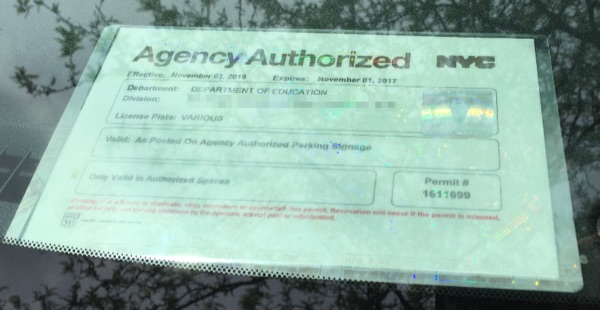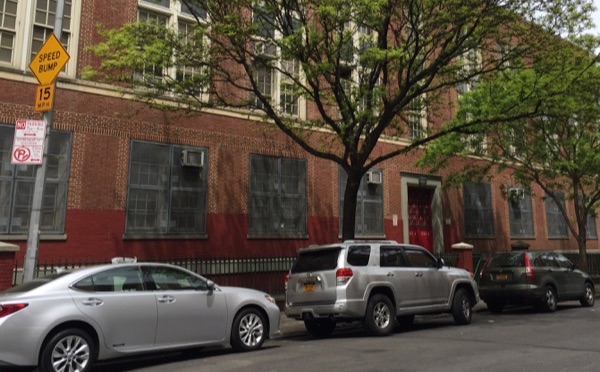Get ready for a lot more car traffic and illegal parking around New York City schools. Tens of thousands of new parking placards will soon be in circulation.
Under the terms of arbitration between the city and the United Federation of Teachers, the Council of School Supervisors and Administrators, and DC 37 -- unions that represent teachers, administrators, and other school staff -- the Department of Education will soon hand out parking placards to any school employee who has a car and requests one, reversing reforms instituted during the Bloomberg administration.
The arbitration stemmed from a 2009 lawsuit filed by CSA, the principals union, a DOE spokesperson told Streetsblog.
The lawsuit was filed after then-mayor Michael Bloomberg reduced placards issued by DOE from 63,000 to around 11,000, aligning the number of placards with the number on-street parking spots reserved for schools.
The DOE cuts were part of a broader effort to reform a placard system plagued by abuse. Placards do not confer the right to park anywhere with impunity, but placard holders tend to treat them as a carte blanche, knowing that enforcement agents will typically avoid ticketing any vehicle that has one.
Like placards issued to NYPD, FDNY, and other city personnel, the DOE's placards were often used to park illegally -- in crosswalks, at bus stops, by fire hydrants -- prompting the Bloomberg-era reforms.
UFT eventually accepted the reduction in placards -- which, it should be noted, did not affect the 15,000 off-street parking spaces reserved for schools citywide. But the CSA sought and won an arbitration ruling that said the placards should be reinstated to comply with the union’s contract with the city. The Bloomberg administration did not reissue the placards, and the CSA sued the city, the Education Department, and Bloomberg.
"Following litigation and negotiations, we are complying with the decision of the administrative law judge," said the DOE spokesperson via email. The extent to which the city's hand was forced is not yet clear. (Streetsblog asked DOE and City Hall for the text of the ruling. We will update the story when we receive a response.)
Now the placard floodgates are about to reopen. Currently, a school with, say, 10 on-street parking spots has 10 placards, which are available to 10 teachers and other staff members on any given day. (The UFT agreement with the city gave school principals and union chapter leaders, who are also teachers, discretion as to how placards are assigned. Schools may, for instance, allocate permits on a rotating basis, or by lottery.) Soon, that same school could have any number of employees competing for those 10 spots, since the number of on-street spaces allocated per school will not increase.

"I have news that many UFT members will welcome,” UFT President Michael Mulgrew wrote in a May 9 member email. "Every school employee who has a car will receive a Department of Education-issued parking permit, and effective May 18 the school’s on-street parking spots will become available on a first-come, first-served basis.”
Unlike before, new placards will confer parking privileges only at the school a teacher works for. In practice, however, that's not enough to curb misuse, since government employees with placards tend to use them whether or not they have a legal space to park. Once the designated spots fill up, placard holders can then use their perk to park in nearby no-standing zones, crosswalks, or other turf that should be off-limits, secure in the knowledge they won't get a ticket.
Tens of thousands of new placards will mean more traffic near schools and incentivize driving over transit. Teachers, administrators, and other school staff who don't drive to work, meanwhile, will apparently receive no commensurate benefit.
Explaining why the union went along with the Bloomberg cuts, then-UFT president Randi Weingarten told the Times: "Anybody who wanted a parking permit got a parking permit, and it didn’t mean there was a spot to go with it, and there was huge frustration." This is the system DOE is returning to.






